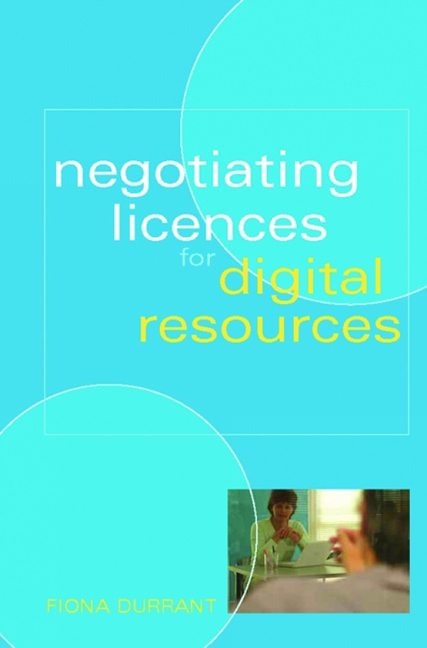Book contents
- Frontmatter
- Contents
- Acknowledgements
- Introduction
- 1 Preparation
- 2 The contract
- 3 Negotiation
- 4 Staff development and communicating negotiation outcome
- 5 Conclusion
- References and further reading
- Appendix 1 Frequently asked questions
- Appendix 2 Negotiation timeline
- Appendix 3 Personal negotiation experience
- Index
- Frontmatter
- Contents
- Acknowledgements
- Introduction
- 1 Preparation
- 2 The contract
- 3 Negotiation
- 4 Staff development and communicating negotiation outcome
- 5 Conclusion
- References and further reading
- Appendix 1 Frequently asked questions
- Appendix 2 Negotiation timeline
- Appendix 3 Personal negotiation experience
- Index
Summary
What are the organization's needs?
There is a very strong argument to support the claim that an organization needs a skilled information professional in order to get it the best deals for online databases on the best terms at the best prices. This information professional ideally needs to be close to the management structure in order to do the best job, so as to get the best understanding of the organization's needs. Depending on the size of the organization, this role may be just one strand of a person's job, or it may be undertaken by people dedicated solely to doing negotiation.
Information professionals are increasingly being involved in the decisionmaking process of the organizations in which they work. Negotiation is just one of the reasons why, ideally, an information professional should have a core understanding of the direction in which the organization is going and how it functions on a day-to-day basis. Some organizations are more open with their employees about what they do and how they do it, whereas in other organizations the information that people need prior to a negotiation taking place may not be freely available to all. Of course the more open environment is the best option, and that is the scenario we have assumed to exist in this chapter. Explaining the importance of negotiation to the management can promote an information professional to a role where they are more involved in organization-wide decision-making.
A professional person's time is valuable. This commodity of time needs to be taken into account fully at the absolute outset of any negotiation. It may be concluded that a small, low-cost subscription is not worth the effort and time of negotiation. A low-value subscription may benefit from just a ‘quick try’ rather than a detailed course of communications. For example, a single subscription with a list price of £50 might be more aptly ‘left alone’ as any gains from negotiation would be outweighed by the time spent, or time spent might be better applied to subscriptions over a defined value. What this ‘defined value’ is remains up to each organization. Having a cut-off point means that human resources can be applied to the deals that need the most amount of time and energy.
- Type
- Chapter
- Information
- Negotiating Licences for Digital Resources , pp. 1 - 36Publisher: FacetPrint publication year: 2006
- 4
- Cited by



